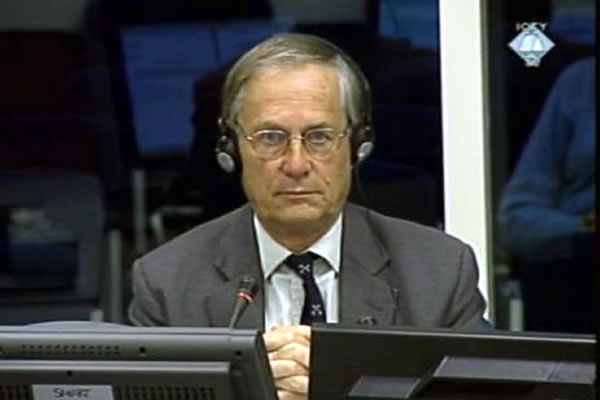Home
GENERAL ROSE: MLADIC HAD ‘COMPLETE CONTROL’
Following the evidence of Munira Selmanovic from the village of Novoseoce near Sokolac, British general Michael Rose began his testimony at the trial of Ratko Mladic. Rose described the accused as a man who, together with Radovan Karadzic, was at the top of the chain of command in Republika Srpska. Mladic was the ‘key person’ when combat operations were planned; as a commander, he enjoyed the respect of his subordinates
 Michael Rose, witness at the Ratko Mladic trial
Michael Rose, witness at the Ratko Mladic trial At the trial of Ratko Mladic, Munira Selmanovic from the village of Novoseoce near Sokolac completed her evidence. On 22 September 1992, she was expelled to Sarajevo with the other women, children and the elderly. The witness’s son and husband, and about 40 other men from Novoseoce’ were detained. The explanation given was that they ‘are going to work’. Their bodies were found after the war in mass graves in Ivan Polje, about one kilometer from the Metaljka field where they were last seen alive.
In the cross-examination, Mladic’s defense noted that the witness didn’t see who killed her family members and other men and when. The defense counsel quoted from a report of the 2nd Romanija Brigade of 28 July 1992, which states that there was a ‘certain number of extremists [in Novoseoce], who are quiet and are not causing problems to the Serb population for the time being, but we keep them under control’. The witness replied that the villagers had handed over all the weapons they had. The Serb authorities from Sokolac told the villagers that they ‘can continue living and working’ in their homes, the witness insisted.
After Munira Selmanovic left the courtroom visibly shaken, the prosecution called British general Michael Rose. In 1994, General Rose served as the commander of the UN troops in BH. Rose described Mladic as a man who, together with Radovan Karadzic, was at the top of the chain of command in Republika Srpska. In Rose’s words, Mladic was the ‘key person’ when combat operations were planned. As a commander, he enjoyed the respect of his subordinates. Prosecutor Camille Bibles asked the witness if he had ever heard about anyone in the Bosnian Serb army doing anything that was contrary to Mladic’s wishes. ‘Never’, Rose responded categorically.
In Rose’s opinion, the Bosnian Serb army usually justified the shelling saying that they were responding to ‘Muslim attacks’. However, the ‘disproportionate’ nature of the Serb response cast doubt on such claims. Rose used the example of Dobrinja where the people had to live in basements. ‘If a cat crossed the street, it would provoke an artillery response of the Serb side’, Rose explained.
The witness’s written statement was admitted into evidence during his examination-in chief. The statement describes in detail the meetings with Karadzic and Mladic at which they discussed the demilitarization of Sarajevo, humanitarian aid deliveries, the operation of public utilities and finally, how to achieve peace. General Rose will continue his evidence tomorrow.
Photos

